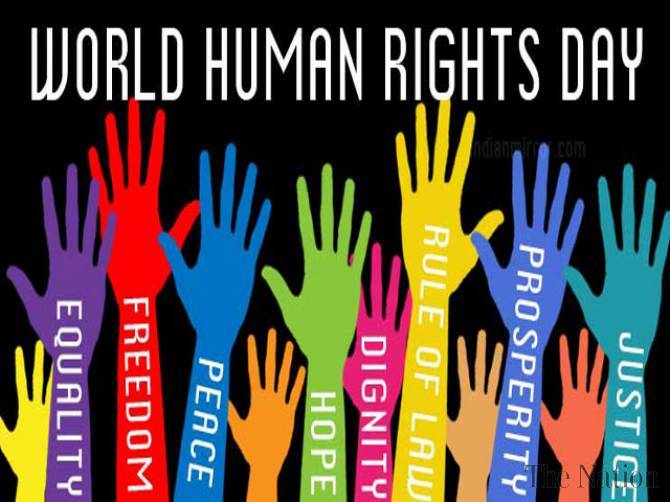The reality is that the contemporary age is the age of human rights. Since 1950 every December 10 World Human Rights Day is observed to promote and raise awareness about civil, political, cultural, economic, and social rights that are the birth rights of all human beings,. The roots of the concept can be traced back to the late eighteenth century in the United States and Europe followed by the last sermon of the Holy Prophet (PBUH) the first ever declaration of human rights in the world.
Human rights are the standards of permitted and forbidden actions in a society and the only universally accepted political-moral idea. UNESCO, Amnesty International and the UN human rights watchdogs are some international institutions that vie to safeguard human rights in the world. Regrettably, in Pakistan, the situation of human rights is startling in comparison with other states, and moreover it has been deteriorating at an unimaginable pace.
The undeniable fact is that human rights violation has reached its nadir in Pakistan. A huge number of incidents of sexual abuse especially with minor children, child marriages, killings of minorities, honour killings and forced marriages have been taking place, and only a few are reported due to social pressures and cultural taboos.
According to statistical report revealed by the Ministry of Law, Justice and Human Rights, from January 2012 to September 2015, total 8,648 incidents of human rights violation have been reported in the country. Out of them, 239 have been recorded in Islamabad, 1,599 in Punjab, 3,768 in Sindh, 1,552 in Khyber Pakhtunkhwa and 1,490 in Balochistan. These include 90 incidents of acid burning, 72 of burning, 481 of domestic violence, 860 honour (karo-kari) killings, 1,564 kidnappings, 20 minority-related issues, 141 cases of missing persons, 1,233 police-related and 112 prison-related violations, 344 rape/gang rapes, 260 sectarian violence/targeted killings, 268 sexual assault/harassment, 493 cases of violence against children and 535 against women and 2,175 miscellaneous violence.
It is to say regrettably that a colossal difference prevails between Pakistani society and western societies as far as accordance with social norms and moral values is concerned. Today, citizens of the civilized western societies call for liberty and empowerment of women through gender equality and equal opportunities in education, decision-making, political representation and business leadership. But it is a matter of great concern that in Pakistani society, gender discrimination prevails and women are treated like cattle and commodities to be sold in the market. We have failed to ensure even protection of life and honour of women.
The Universal Declaration of Human Rights of United Nations General Assembly under Article No 3 says that everyone has the right to life, liberty and security. Article No 5 says no one shall be subjected to torture or to cruel, inhuman or degrading treatment or punishment. But in Pakistan, there is no implementation on the articles, and human rights are alarmingly violated with no fear of law and punishment. Humanitarian crime is on the increase to epidemic proportions especially against the vulnerable, the poor, women and children. The incidents of domestic violence, child abuse, forced marriage, honour killing, rape and gang rape with minor girls, boys and women, and acid and chemical attacks on women are rampant in the country. The incidents are a reflection of barbarism, tyranny, and pandemonium existing in the society.
Chairperson Human Rights Commission of Pakistan (HRCP) Zohra Yusuf points out that this year’s Human Rights Day marked 50 years of the United Nation’s International Covenant on Civil and Political Rights and the International Covenant on Economic, Social and Cultural Rights. However, both conventions are signed by Pakistan, but have not been implemented practically thus far. This is a heartbreaking fact that in Pakistan, 0.5 to 0.6 million members of the Ahmadiyya community are deprived of their right to religion. Ahmadis cannot offer prayers at any public places due to fear of being imprisoned and fined. They pray in their houses and their houses of worship have no legal status. Data compiled by the community reveals that following the 1984 Ordinance against the Ahmadis, between April 1984 and September 2015, around 765 Ahmadis have been charged for displaying the kalma, 447 for posing as Muslims, 93 for offering prayers, 303 booked under the blasphemy law, 796 booked for preaching, and 27 of their mosques have been demolished.
Recognition and provision of equal and inalienable rights to humans is sine qua none for establishing society based on freedom, justice and peace. If we want to have such society, citizens must enjoy freedom of speech, belief and protected life, honour and property. Humans are to be treated like humans but are not to be slaughtered like animals. Change in mindsets and attitudes toward women are needed. Atmosphere to realize gender-equality not only in words but also in practice is to be generated in all sections of population especially in downtrodden one.
Human rights organizations, women’s organizations, trade unions, environmental organizations, bar councils and the academia collectively have to play their role in the implementation of all the international conventions including the Universal Declaration of Human Rights to ensure protection of rights, honour and lives of people in the country.






